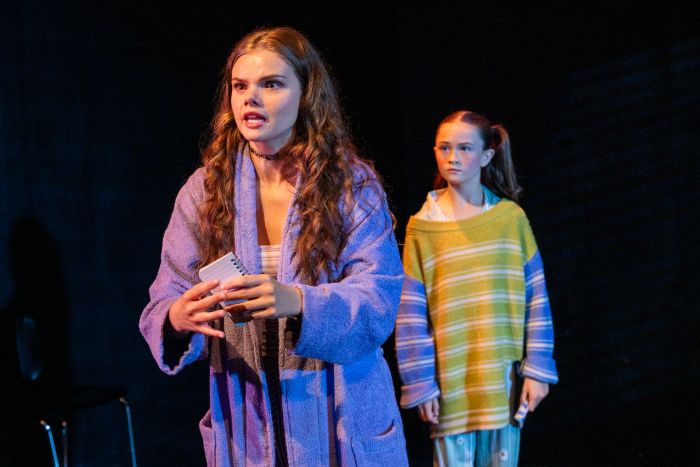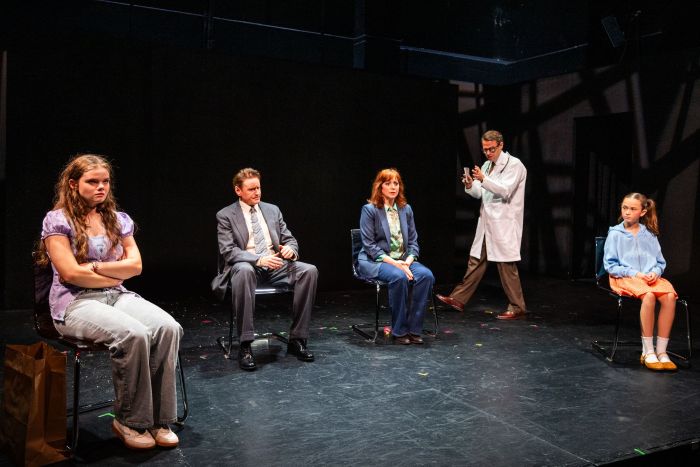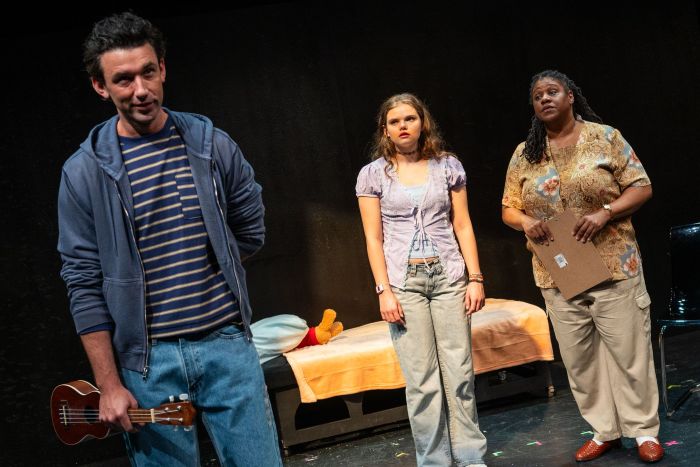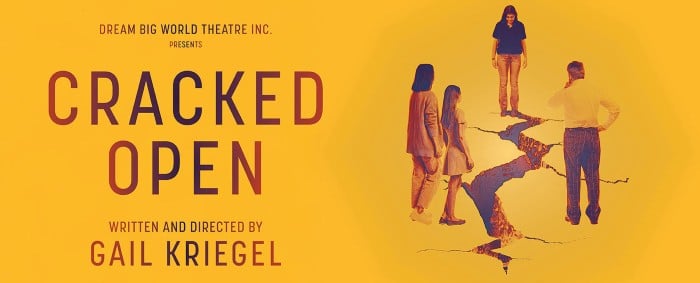When eighteen-year-old Tilde experiences the onset of mental illness, her family struggles to navigate the conflicting diagnoses, complexities of treatment, and social stigma, their own fears, and attempts to understand the new reality of their situation in Cracked Open, a world-premiere drama written and directed by Gail Kriegel and produced by Dream Big World Theatre for a limited engagement at NYC’s Theatre Row. Opening in May, in recognition of Mental Health Awareness Month, the production espouses a mission of inspiring conversations, spreading awareness, and encouraging those affected to seek help.

Set in 1995 NYC, the narrative moves through three main segments. In “The Beginning,” Tilde physically lashes out, just as her high-school graduation party is about to start, causing it to be cancelled, with a false explanation given to the guests waiting outside. It then goes into “The Wilderness” of unexplored territory, as she and her “ordinary” family grapple with doctors, social workers, healthcare facilities, the reactions of her younger sister Edith, who prefers to stay with her grandmother Lillian until Tilde can come home, her mother Mae, who suffers a severe panic attack, and her father Rich, a news reporter who cancels Tilde’s health insurance out of concern that her condition will go public and threaten his job, and the other patients at the residence in which she’s being treated, who range from sweet and caring to violent (fight direction by Judi Lewis Ockler). It closes with “Afterwards,” when they begin to come to terms with “Life Now.”
Staged in a simple black-box space (set by Mikaila Baca-Dorion and Yang Yu) – with acrylic chairs, a few other pieces of movable furniture, and props (by Baca-Dorion) that identify the different locales, as do the ambient sounds (by Bill Toles) – the minimalist design is intended to keep theatergoers focused, without distraction, on the people and their stories, literally shining a spotlight in the darkness (lighting by Yu) on a subject that is not often seen and giving voice to those who are not often heard. It’s a raw look at the emotional pressure placed on everyone involved, the insults and epithets that exacerbate the trauma, and the resilience, support, and abiding love needed for dealing over the long term with the impact of mental illness.

A cast of eleven, with seven appearing in multiple roles, portrays an array of characters, in costumes (by AC Gottlieb and James Nguyen) that define their ages and professions, from the family, starring Katherine Reis as Tilde, Pamela Bob as Mae, Bart Shatto as Rich, Blaire DiMisa as Edith, Lisa Pelikan as Lillian, and Paul Castree as Rich’s brother and cameraman Michael, who champions transparency, to friends and acquaintances, including Scott Harrison as Rabbi Hill from the synagogue next door, in whom Mae finds comfort, and Jeene Vath as Sophia, a member of her support group, to the medical professionals who are at odds about Tilde’s condition and medication (in an absurdist scene in which each of them, standing in a row, gives a clashing, and sometimes ridiculous, opinion). Turning in standout performances in two of the most likeable and heartwarming roles, filled with kindness and empathy under the most challenging of circumstances, are Joyia D. Bradley as Willy, the caring and generous proprietor of Willy’s Luncheonette, who helps the quiet young Hope, played by Madeline Grace Jones, with her zipper and is there for everyone who needs her, and Rubén Caballero as Billy, a 28-year-old fellow resident at the facility who sings to Tilde, plays the ukelele, and shares a romantic attraction with her, then undergoes a severe attack by another “noncompliant” patient.

While the subject is of significance, and Kriegel – who was twice named Volunteer of the Year by the National Alliance for Mental Health during her fifteen years of service, after a member of her own family had a psychotic break – writes from personal experience and research, for me, the slow-paced script, its fourteen short scenes, and nearly three dozen characters could use some tightening to eliminate confusion, redundancy, and attempts at humor that don’t always land (there’s a recurring joke about a chicken that animal-lovers and vegetarians will find sickeningly unfunny), and to give greater emphasis to the main storyline and protagonists. And while there are some emotionally believable and natural performances, some of the deliveries feel stilted or histrionic, rendering them less than convincing, sympathetic, or relatable.
With that said, statistics show that an estimated one in four Americans lives with mental illness. For those who have been impacted and others who want to learn more about its effects on family and community, Cracked Open offers a rare look and an open door into the timely topic.
Running Time: Approximately 90 minutes, without intermission.

Cracked Open plays through Saturday, June 28, 2025, at Dream Big World Theatre, performing at Theatre Row, Theatre 4, 410 West 42nd Street, NYC. For tickets (priced at $42-94, including fees), go online.



